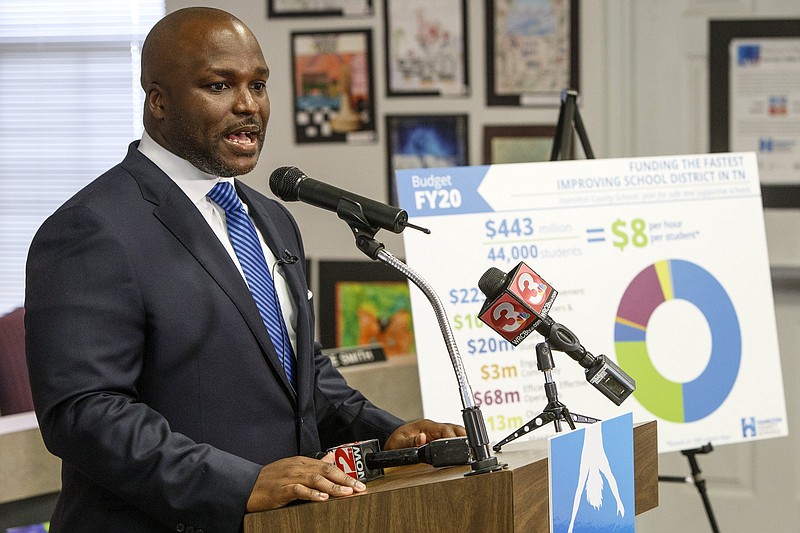It's no secret that our county has dire education needs. We've chronicled those needs here many times.
Likewise, local industry leaders, Chamber of Commerce leaders and school leaders have made the case for better education here, commissioning reports in recent years that show - no matter how we played with the numbers - that only about 34% of our third-graders can read at grade level.
A big "why" is that the majority of our children are not school-ready when they come to kindergarten and first grade. Since we read to learn, this handicap tends to follow our children throughout their lives, and only 38% of our high school graduates are seen as jobs-ready by local employers. Our students' learning, or lack of it, affects the city's crime rate, economic growth, wages, tax base and financial stability.
In many ways, the community has stepped up. County commissioners in 2017 passed a tax increase (though they didn't call it that) to give schools a one-time $110 million for capital projects - new schools and deferred maintenance. Chattanooga's Mayor Andy Berke and the City Council funded a Baby University to help new parents understand the value of talking with and reading to newborns and toddlers who will gain 80% of their brain's growth in their first few years of life. The city also, despite not having responsibility for funding schools, is paying for an early childhood education program for more than 1,000 pre-K youngsters. Volkswagen led the way in starting up an industry-based set of training programs for new workers. That work has blossomed into a partnership with our schools dubbed Future-Ready Institutes - a new $11 million district investment in high school programs aimed at graduating students not only with high school diplomas but also professional/vocational certificates.
Those are wonderful first steps, and in 2018 our school district achieved its highest graduation rate in five years - 86.5%.
But it's not enough. And we all know it.
Hamilton County Schools Superintendent Bryan Johnson made that case to the Hamilton County Board of Education Thursday evening, asking for an additional $34 million in the district's fiscal 2020 budget. He said the request is critical to the future of student success.
"It is an important budget for our school system, an important budget for our children, and important budget for our community at large," Johnson said. "The reality is we are at an inflection point. This is the moment in time for this community that we really have to accelerate student achievement. It's time to get it right. It's time to really invest in the promise of our children."
Johnson introduced a $443 million operating budget that would fund about half of the $80 million in increased needs and priorities that have been identified across the district. He said asking only for an additional $34 million was "aspirational, not unreasonable."
If approved and fully funded, this budget would mark the first time in 14 years school officials see a budget increase for school operations above that achieved by normal growth in county property values and inflation.
Imagine not increasing the operating budget of your home in 14 years. How many lights would you have to leave off permanently?
The extra $34 million would pay for 350 new positions, including 10 social workers, 10 special education teachers, 11 art teachers, about 100 other teachers, about 100 education assistants, 15 truancy officers, 14 school counselors and 9 principal/assistant principals.
It would also include funding for increased technology such as giving every student a laptop, eliminating general school fees and providing more funding for teachers to attend training opportunities
Another big plus would be teacher raises. The extra money would allow Hamilton County to give teachers a 5 percent pay boost (including the state's planned 2 percent bump.) That's important for recruiting and retaining top quality teachers: Even Cleveland city and Bradley County school systems offer better starting-teacher salaries than we have been able to offer.
For the most part, Hamilton County school board members praised the proposed budget. District 2 board member Kathy Lennon said, "[W]e have to do it." District 8 board member Tucker McClendon called it "bold." District 3 board member Joe Smith said, "[W]e have a lot of needs, and if we really want to invest in our kids' education, then let's invest in it."
Two board members, District 1's Rhonda Thurman and District 9's Steve Highlander fretted that county commissioners, who also must approve the plan, would want a balanced budget, not an aspirational one.
County Mayor Jim Coppinger told Times Free Press reporter Meghan Mangrum that another tax increase would be necessary to fund the budget request, but we'll need some explanation for that. The $110 million to the schools out of the 2017 tax increase might have been a one-time expenditure, but collecting taxes on that tax increase has not been and never will be a one-timer. Every year around the end of February all Hamilton County property owners are still being told their tax bills are due.
Our children are our future.
